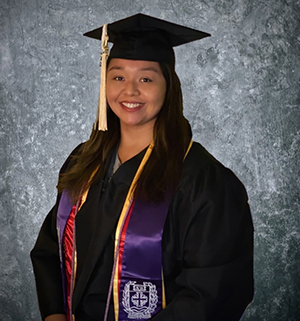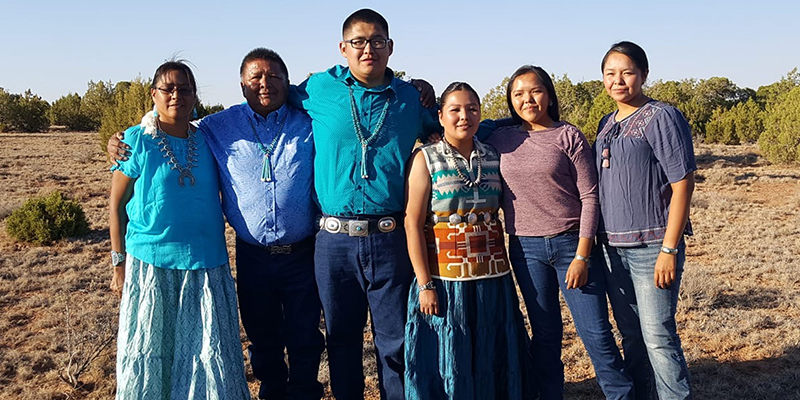
Alumni
Portland Magazine
May 26, 2021
Thoughts from a Graduating Senior
By Devonna Begay ’21
 Four years ago, with two suitcases in hand, I left for college from my home on the Navajo Reservation in Arizona. I’d only had three previous experiences on an airplane. At the time I had my vision set on becoming a police officer and returning to the Navajo Nation to work in law enforcement. I’d watched the animated movie Zootopia in 2016, and I felt like Officer Hopps, the bunny rabbit police officer, coming from a small town to the big city, Portland. I also shared the same dream of becoming a cop and, like her, I was very scared. I did not know what I was getting myself into.
Four years ago, with two suitcases in hand, I left for college from my home on the Navajo Reservation in Arizona. I’d only had three previous experiences on an airplane. At the time I had my vision set on becoming a police officer and returning to the Navajo Nation to work in law enforcement. I’d watched the animated movie Zootopia in 2016, and I felt like Officer Hopps, the bunny rabbit police officer, coming from a small town to the big city, Portland. I also shared the same dream of becoming a cop and, like her, I was very scared. I did not know what I was getting myself into.
I am fortunate enough to speak and understand my native language. Many people my age and younger do not. I was raised with Navajo traditional maternal and paternal grandparents. They all only speak Navajo and do not speak or understand English. Both of my parents taught me Navajo and English at the same time. Hearing the language day in and day out, being immersed in it, I eventually became fluent. My parents have both also taught me traditional practices and beliefs.
One of the main teachings that got me to where I am today is the saying T’áá hwó ají t’éego. This phrase, instilled in Navajo teachings, means “It is up to you.” My parents have always supported my decisions, but they knew I had to want them. I had to apply to college, file my own FAFSA, advocate for myself, etc. This teaches people that nothing is just going to be given to you in life—you have to go get what you want. You are in control of your future, make it what you want. For this reason, I left for college because I believed having a degree would open up more opportunities for me.
I always knew I was from a family that valued education, even if I did not know the opportunities it would give me. When I was very young, my mother taught me at home. I lived in a rural location where I did not have access to running water or electricity. At the time, my mother was obtaining her associate degree and would have to drive about two hours to get class materials, and she would also get us books. She taught me and my sisters how to write our names by tracing and teaching us the alphabet and numbers.

One distinct memory that I have from my elementary school years was preparing the trail between my home and the bus stop before the beginning of the school year. My father would remove shrubs and bushes so we could know where we were walking with our flashlights in the dark hours of the morning to make it to the bus stop on time. We would have to walk to the bus at 5 a.m. for a little over a mile. Every day for several years we made this trek just to get to school.
Now that I look back, I see that my parents did so much for me, and I know I will never be able to repay them for what they have done to help me get to where I am.
In the summer of 2016, I attended a summer college preparation program for Native American students. The program is called College Horizons, and this is where I learned about the scholarship—the Davis New Mexico scholarship—that has helped me pay for college for the past four years. My counselors encouraged me to apply, so I did, not knowing what opportunities it would bring me. One day I came home, and my mom had mail for me. I knew it had to be something good because it was in a large envelope. When I opened it, confetti came out, and my mother and I read the letter that announced I was a Davis New Mexico Scholar! Receiving the Davis New Mexico scholarship was the ticket that would allow me to leave the reservation and see places that I had only dreamed of seeing. I am part of the first cohort to graduate from UP, and I have enjoyed seeing more and more Davis New Mexico Scholars come to UP each year.
From my first year until now, I have grown so much as an individual. My first year I was very much a quiet student and did not speak up in class and kept to myself. It wasn’t until I joined Army ROTC that I was assigned to hold leadership positions, and I began to gain confidence in leading. The First Generation (FGEN) program also allowed me to give my input. Eventually, when I became the coordinator, I was the one planning all the events. I have also been the Native American Alliance treasurer for the past three years, which has allowed me to connect with many other like-minded BIPOC leaders. I would encourage others to take on leadership positions and get out of their comfort zones because that is where growth is. Yes, I did gain knowledge in the classroom, but in regards to leadership skills, that happened outside the classroom setting.
I did not want to lose my Navajo (Indigenous) identity in the process of being away from home. So I have tried to maintain those traditional ties to my native language, cultural practices, and traditional ceremonies but also live in the western world. It is hard trying to balance these two worlds; it’s something that is always on my mind. My parents and grandparents have continued to encourage me to keep speaking my language, and I also know the importance of doing so. Some of the ways that I have tried to keep speaking the language is when I call home, I try to speak Navajo and try to live by the traditional teaching that I was brought up with.
At the beginning of the pandemic, I decided to stay here in Portland because I did not have internet access back home. I also decided that it would be best to stay here and not see family because of COVID-19 and the impact it was having on my community. I was afraid that if I attempted to go home and, in the process, infected any family or community members with the virus, I could never forgive myself. When I think about the people who have passed due to COVID-19, I think about the language and culture loss that also comes with that loss of life.
In late March I was finally able to go home and get my first dose of the Pfizer vaccine administered by my tribe. Going home and finally seeing family was very emotional. We did not know when we would see one another again. Even though the past year has been very hard, I knew that I had to keep going and graduate because my parents had sacrificed so much for me to get to where I am today.
It’s hard to think about graduating without sharing some final moments with professors and advisors who have helped me throughout the past four years. It’s hard to think about graduating without an in-person commencement for me and for my family. I am trying to stay optimistic.
The pandemic has also changed my post-college plans. Before COVID, I thought that I was going to apply to graduate schools and continue my education, but this changed because both of my parents lost their jobs last March. Both of my parents worked in the tourism industry back home, and they still have not returned to work. This has forced me to prioritize getting a job right after graduation. In the process of learning more about my interests, ways I can help others and the social justice movements, I reevaluated my career aspirations as well. I realized that I could do more by helping BIPOC communities in other areas of work instead of policing. Not everything about the pandemic is bad because it has given me time to self-reflect and think about what I truly want to do after college.
University of Portland
5000 N. Willamette Blvd.,
Portland, Oregon 97203-5798
503.943.8000
This website uses cookies to track information for analytics purposes. You can view the full University of Portland privacy policy for more information.
